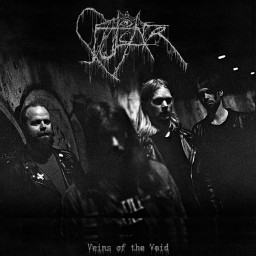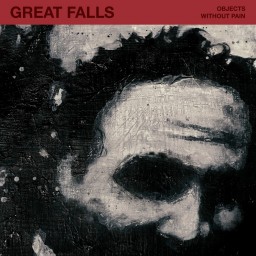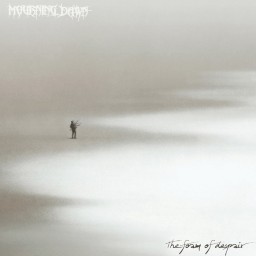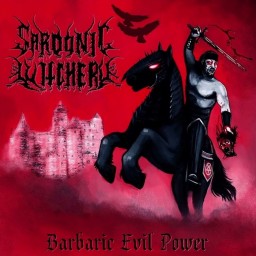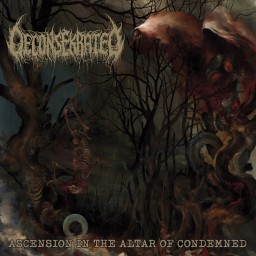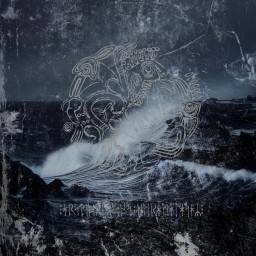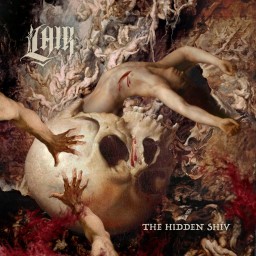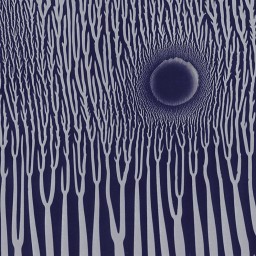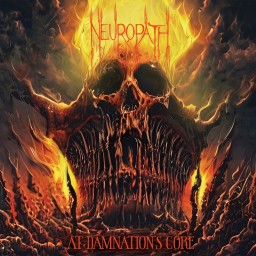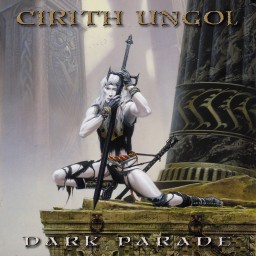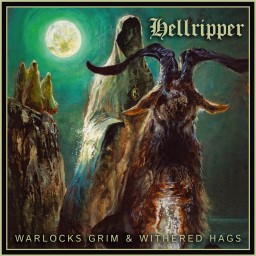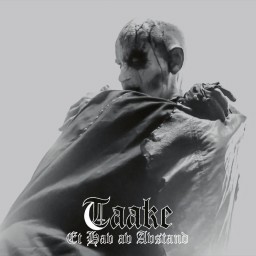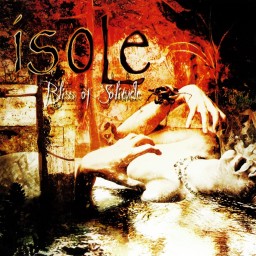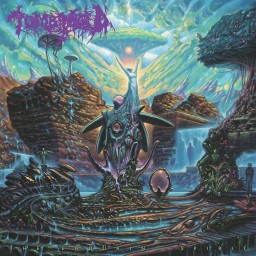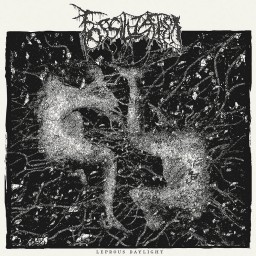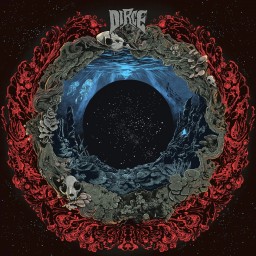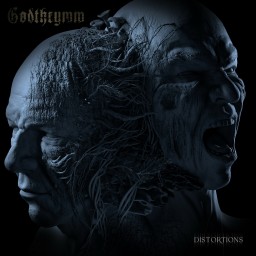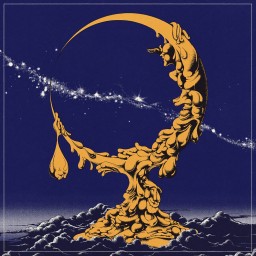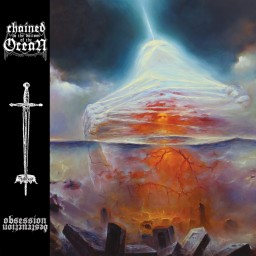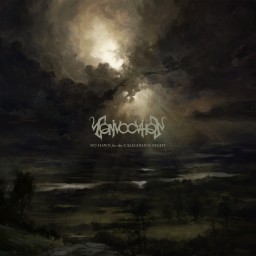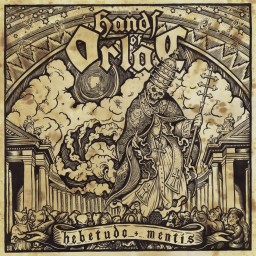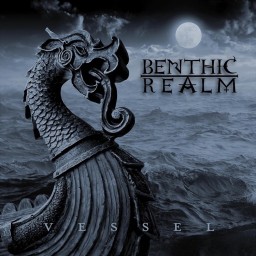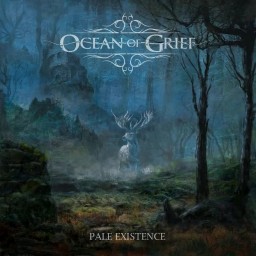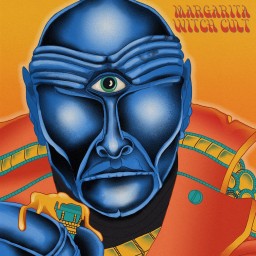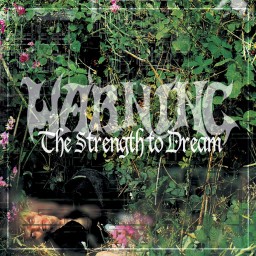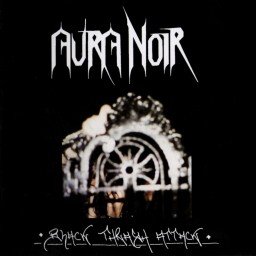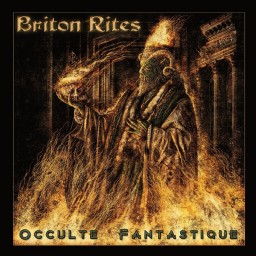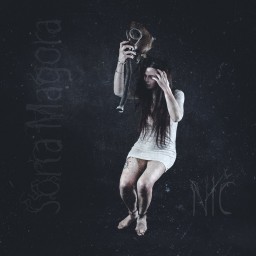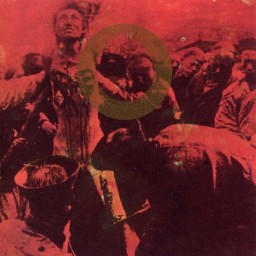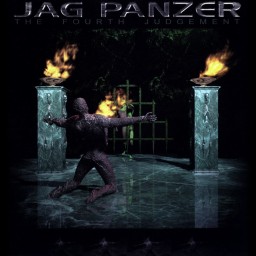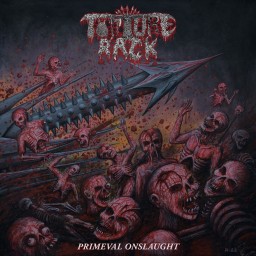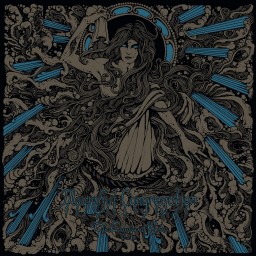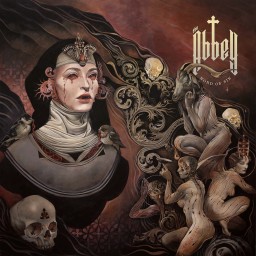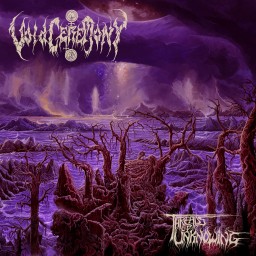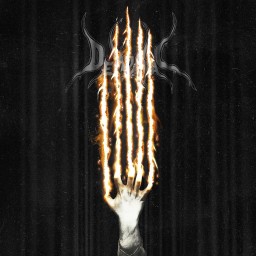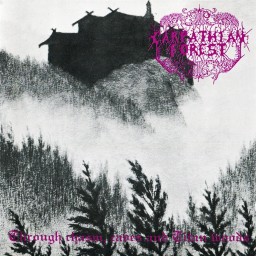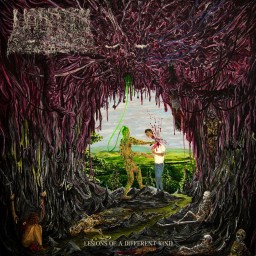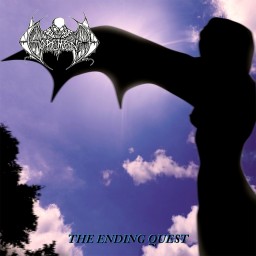Sonny's Reviews
Norwegian thrashers Sepulcher are back with their first release since 2018's well-received Panoptic Horror album. Veins of the Void is a sixteen-minute EP, featuring three tracks, Derealization, Cryogenic Sleep and the title track. The production has the band's usual pseudo-lo-fi feel - it isn't actually truly lo-fi, it is as if they deliberately want to give their sound a garage band aesthetic, whilst still using a modern recording set up. I'm not an expert on the genre, but I guess Sepulcher could well be tagged as a stenchcore band with this crusty production and the thrash, death and trad metal genre fusing on show.
Opener Derealization starts off with a looming, sludgy feel with a quite infectious riff before alternating between fast bursts of deathly aggression and lethargic slower-paced moroseness. Middle track Cryogenic Sleep is the shortest track here, running for a touch over two and a half minutes, and is a slice of adrenalised crossover thrash with an energetic fast tempo and a bouncy, punky riff to it. In truth that is the only track with any significant thrash content. The title track closes out the EP and has a deliberate, sludge-like pacing with a chunky riff, a quite groovy drum track, a weird guitar melody and Andreas Fosse Salbu venting his frustrations at all and sundry with his pissed-off, shouted vocals.
Whilst no classic, this is reasonably interesting and with a fair bit of it running at a slower tempo than usual I'm not sure if this EP is signalling a change in direction for Sepulcher, or if they are just clearing the decks ready for the next full-length.
Genres: Thrash Metal
Format: EP
Year: 2024
For sure there are a couple of things I liked about Objects Without Pain, the guitar tone is nicely pitched and best of all the drums sound amazing. I could listen to an isolated drum track of this quite happily and would prefer to over the finished thing. Unfortunately I couldn't take to it other than that. The songwriting is too spasmodic for me, it veers far too much into mathcore, djenty type territory for my preference and although I really like the tone of the album, the actual songwriting leaves me cold. But the absolute killer for me is the vocals. I would be the first to admit that I probably put too much weight onto vocals but I think I am quite tolerant of some very divisive vocalists, Silencer, Cirith Ungol, King Diamond or Demilich for example, but if I take against a singer then it is like a movie with Adam Sandler in it and no matter how good the rest of the production, it still has Adam Sandler in it! Such is the case with Demian Johnston, his vocals amount to little more than shouting at the top of his voice and just come over like some angry child berating his parents for some perceived injustice and which I find wearisome in the extreme. I don't have an issue with shouted vocals per se, but these are just irritating and off-putting to me to the degree where, by the second half of the album, my mind is wandering and I have pretty much tuned out. I seem to be a minority of one and good luck to those who derived far more enjoyment from it than I was able to muster, but this just isn't one for me I'm afraid.
Genres: Sludge Metal
Format: Album
Year: 2023
Hauntologist are a post-black metal duo from Kraków comprising Mgła drummer, Darkside, and multi-instrumentalist, The Fall (Michał Stępień), Mgła bassist and backing vocalist for live performances. Hollow is the duo's debut full-length and seems to have been met with mixed reactions, a lot which seems to be based upon people's attitude towards Mgła and how much this does or doesn't sound like them. I don't mind Mgła at all, but I have only heard Exercises in Futility which I enjoyed, but not as much as many others did I suspect and so I'm going to buck the trend and take Hollow on it's own merit, not by it's comparison to another project.
I found this to be pretty interesting and hugely entertaining to boot, which may not be enough for some who need their world to be turned upside down by every release, but is more than enough for me. I often find post-metally BM to be a bit of a bore, to be honest, and went into this with a little bit of trepidation, but it kept me rapt pretty much throughout with some nice twists and turns, the three-quarters of an hour runtime seeming much shorter, which is always a good sign. Fast, intense passages of blasting atmospheric black metal are complemented by contemplative and melancholy airs that temper the furiousness of the black metal sections with more reflective atmospheres. There is a certain harshness to the production, coupled with The Fall's ascerbic vocals and icy-sounding tremolo guitar lines that gives the overall aesthetic an inherent frostiness. Darkside's drumming is top knotch throughout whether it's his withering blastbeats or skillful fills that are to the forefront at any one time. The faster sections aren't just composed of layers of indistinguishable tremolo riffing either, but rather The Fall focusses on producing cool and memorable riffs rather than just continuously swamping us with "atmosphere". Elsewhere there are the folky acoustic guitar and clean vocals of the title track and the gothic, post-punk vibe of Gardermoen but these sit well within the overall structure of the album and aren't at all distracting or obtrusive, giving the album a freshness of perspective. The album closes out with a gently self-reflective spoken word piece that leaves the listener slightly wrong-footed and provoking them to reconsider what they have heard during the previous three-quarters of an hour.
Overall this is a fine album of modern atmospheric black metal that draws on the tropes of post-metal and introduces influence from other, non-metal genres whilst still acknowledging the power of the riff in metal. It isn't very challenging to listen to and is, in fact, very easy on the ears, but I don't view that as an issue personally. The length is just about right and keeps things focussed with no tendency towards self-indulgence that may have blighted a lengthier runtime.
Genres: Black Metal Post-Metal
Format: Album
Year: 2024
According to RYM I have listened to over 1500 doom metal releases, so I think I can be forgiven for feeling a little jaded when approaching most new doom releases, particularly those coming out at the start of the year when, for some reason, the quality isn't always the greatest and especially by little-known acts who have been plugging away to little or no acclaim for years. Parisian four-piece, Mourning Dawn, are exactly one such act and their new album, the oddly titled The Foam of Despair, tagged as a Doom / DSBM hybrid, didn't exactly have me trembling with anticipation either. So, by the time opening track, Tomber du temps, came to an end, I was pleasantly surprised to find myself with a big stupid grin on my face as I was completely won over and enchanted by the preceeding ten minutes of downtuned bliss. Actually the original tags were a bit off the mark, The Foam of Despair is not black metal by any stretch and whilst it is rooted in doom metal it is really an album which should come under the atmospheric sludge umbrella and one which is given a freshness by pulling in additional influences from the likes of gothic and industrial metal.
That opener that so grabbed my attention has some really infectious riffing coupled with Laurent's howling vocals and a post-metal structure that plants it firmly in the atmo-sludge arena. What elevates it though, is some really nice soaring guitar soloing and spoken word interjections (an effective trope the band use several times throughout the album) that impart a melancholy air, with the cherry on the top being a reflective-sounding sax solo that closes out the track, bringing to mind some of the great work from Belgium's Messa.
Although Tomber du temps is the best track on the album, it is by no means downhill from here on in. Second track, Blue Pain, features a guest appearance by our old friend Déhà (who also mixed and mastered the album - how does he find time to sleep) who lends the track his desperate-sounding howls to provide a bit of a twist to what is otherwise a slab of Paradise Lost-inspired gothic metal. Borrowed Skin, the album's longest track, delves into the atmo-sludge playbook with a layered build to it and featuring some fine percussion work from drummer Nicolas Joyeux, the track's emotional tides rising and falling from becalmed quiet to looming and towering anguished waves, the only niggle here being the rather abrupt fade-out at the track's ending (which is also the case elsewhere with Suzerain).
Apex has a plodding chug to it that gives me an industrial metal vibe, albeit not as obviously as on closer Midnight Sun which goes full-on industrial with Nicolas Joyeux once more featuring with some imposing-sounding metallic percussion hammering away like Vulcan's Forge itself. Elsewhere Suzerain has a nice bass-heavy chugging throb with, once more, those solemn spoken word vocals and The Color of Waves is a depressive and desperate-sounding slice of post-metal atmospheric building.
The production is crisp with all the band members' contributions being readily distinguishable and allowing their inherent technical ability to shine through. However, the biggest plaudits go out to these frenchmen for their mature and interesting songwriting that encompasses multiple genres and forges them into a coherent and flowing whole, providing a compelling listen for fans of atmospheric and emotionally-charged metal and has made this my first must-hear album of 2024.
Genres: Doom Metal Sludge Metal Post-Metal
Format: Album
Year: 2024
Sardonic Witchery is a solo project of Portugal's King Demogorgon (Ricardo Mota) who used to be one half of black metal duo Infernal Kingdom. After a, frankly awful, intro, King drops the hammer on some reasonable blasting black metal with riffs that sometimes fly close enough to traditional metal that they almost come over as black 'n' roll. He has quite an acerbically harsh, roaring style of singing that comes across more as angry than evil at least until Merciless Warrior of Steel when he just sounds hokey as he tries to pull off some kind of Tom G Warrior-like "death grunts".
The production of the album is good, with the bass lines being nicely presented and boosting the riffs well, although the snares are pushed forward and get a little bit annoying after a while. There's not really a whole lot more to say, this is a decent enough piece of black metal that is best when it's blasting hardest, but which is also prone to fly close to black 'n' roll grooviness with trad metal influence shining through and some inherent cheesiness. As such it treads familiar ground, albeit mostly with professional aplomb. There aren't really enough stand-out moments that will keep you wanting to respin this, with the duo of Barbaric Bastards of Mass Destruction and Horizon's End being the section that meritted most attention from me and had me wishing the quality of those two tracks was reproduced throughout the album's almost forty minutes rather than being confined to a mere ten. So, ultimately I guess, it will end up on the pile of releases of the year marked "solid if somewhat unremarkable black metal" - and I am sure it won't be the last.
Genres: Black Metal
Format: Album
Year: 2024
Another quality outfit from the Chilean metal scene, death metal four-piece, Deconsekrated, have now unleashed their debut album upon the world. They aren't reinventing the wheel here, or really doing anything that hasn't been done hundreds of time before, but it is skillfully executed and full of vitality and energy, with the occasional breakdown into a more considered death doom pacing providing tempo variation. Vocalist Gûl Evokator has a harsh barking growl that gives the vocals a convincing howling abyss-demon quality that sits very well within an old-school-influenced death metal context. Alongside that there are a couple of ritualistic-sounding ambient, chanted parts in the intro, "Invocation" and the first part of the album's longest track, "Litany of the Blasphemous". Mostly though, it must be said, this is pummelling, no frills, blasphemous death metal, a style of DM that I am very much at home with and can appreciate for it's lack of pretension and focus on providing neck-wrenching blasts to inspire even the most reticent of moshpits.
The production is spot-on with the riffs sounding beefy and precise, aided by the muscular rhythm section of bassist Fides Naash and drummer Rigor Mortis (something tells me these guys may be using pseudonyms) who sounds at times like he is pounding on the inside of the listener's own skull! Guitarist Agorh Skullptor unleashes the odd short, Slayeresque solo, but nothing indulgent or ill-fitting to distract from the impending battery. There are plenty of lines to be drawn to OSDM classics like Mental Funeral, or Diabolical Conquest, but with a more modern production which may not deliver the full cavernous experience, but does sharpen up the riffs and provide a sharpness to the sound that gives it a focus away from a deathly, foetid atmosphere and more onto musical precision. The strength of chilean metal is that it shows a reverence for metal's former glories whilst unafraid to adopt a modern approach and production that ensures that the material has relevance. And so 2024 kicks off in solid style with the chilean scene showing exactly why it is growing in reputation within the metal world.
Genres: Death Metal
Format: Album
Year: 2024
Árstíðir Lifsins have become one of my favourite pagan black metal bands over the last few years, mainly due to the quality of their two Saga á tveim tungum (Story in Two Languages) albums and their ability to craft sweeping nordic epics that stir the blood and lift the soul. Their latest release, Hermalausaz, supposedly an EP, consists of two lengthy tracks, Ýrr and Þistill, with a total runtime of over forty minutes, which once again illustrates the Icelanders' ability to compose saga-like epics as befits their own cultural heritage. The lyrics are written in Old Norse poetic form, as were the sagas of old and are, as is revealed on the EP's Bandcamp page, "inspired by the runic inscription of the western Norwegian Eggja rune stone", which is a rune-carved grave-covering from around 650-700 CE, the runes upon which tell the tale of a shipwreck caused by a mighty sea-creature and the journey of the lost to the land of the dead.
The instrumentation is first and foremost powerful and epic-sounding black metal, with quite a thick bottom end over which the tremolo riffing can sweep and soar and featuring a variety of vocal styles from throaty, shrieking howls to harmonised, baritone nordic chants. The pummelling double kick drums and punishing blastbeats of Árni Bergur Zoëga's drumming propel the tracks along with an intense fury borne of raw, old-school black metal. However, interspersed within this sweeping, metallic maelstrom are folk-inspired, mournful-sounding acoustic sections, that are mercifully bereft of the inherent cheesiness often associated with folk metal, but rather serve as tonal contrasts, representing the rising and falling of the narrative threads within the tales and allowing moments of respite from the black metal intensity. Other times a slower, melodic theme will take over, often with a piano or keyboard accompaniment, to introduce a different narrative thread and further variety within these epics' tonal pallette.
I see Árstíðir Lifsins very much as the torch-bearers for a narrative style of black metal championed by Enslaved on their early releases such as Vikingligr veldi's "Lifandi lif undir hamri" and Eld's "793 (Slaget om Lindisfarne)", although those were more stripped-back than Hermalausaz' powerful-sounding production, there is still a direct line of epic-storytelling running from one to the other. With only three members and only two being instrumentalists, the music Árstíðir Lifsins' put out is testament to the technical proficiency and adaptability of the band members, sounding like a veritable horde of norse heroes on a musical rampage through some poorly-defended coastal enclave. A massively underappreciated band with a glorious and epic vision of what they are about and the music they want to produce, I hope they ultimately get the praise they deserve.
Genres: Black Metal
Format: EP
Year: 2023
Richmond three-piece, Lair, are back with their sophomore, four plague-ridden years after the self-titled debut. They play bereft and pissed-off sounding sludgy doom metal that sounds very much like a band with an axe to grind about many things, but particularly the bleakness and futility of existence, so if you come into this with a sunny disposition, then don't expect to leave it feeling the same!
First off, it does plug into the post-pandemic, confused and bereaved mental space very well, giving vent to a hopelessness and desperation borne of things out of one's control as expressed in heavy, towering and slothful riffs, primitive-sounding drum beats and a vocalist who's throat-wrecking howls to the sky are the epitome of bleakness. So, if that doesn't float your boat then you are definitely looking up the wrong alley here, but for those who worship at the altar of acts like Eyehategod, Acid Bath or Toadliquor, then come on in my red-eyed friend and pull up a chair. OK, so the vocals do become a bit samey and you find yourself wishing for a change in delivery or inflection and the riffs aren't the most inventive, but this type of sludgy doom is more about the overall aesthetic than individual moments, the repetitiveness seeking to add layer upon layer of despondency upon the listener to achieve that atmosphere of alienation, desperation and anger, that anger being the prime ingredient of good sludge metal I would suggest. Even saying that, this isn't completely monolithic, with an instrumental breather in Something’s at the Door, it's gentler sound setting up the faster, almost death metal of (To Step Into) A Noose of One’s Own. Although normal service is soon resumed and they get back onto the dreary, doom-laden and sludge-filled treadmill for the final three tracks.
The Hidden Shiv is a fairly solid slab-o'-sludge that ticks a lot of the right boxes and, in all fairness, is growing on me the more I listen to it, but I wouldn't speak of it in the same tones as the earlier-mentioned sludge flag-bearers. But that said, they have come on a fair bit since I last checked them out via their 2018 EP "In Exile" and they are definitely moving in the right direction.
Genres: Doom Metal Sludge Metal
Format: Album
Year: 2024
Sunn O))) were formed in 1998 by Goatsnake's Greg Anderson and Stephen O'Malley, who was looking to form a new outfit after the splitting-up of Burning Witch, their name intended as a pun on Earth's moniker as the drone pioneers were huge influences on Anderson and O'Malley. The Grimmrobe demos were released in 2000 as the band's debut release, with the duo's worship of all things Earth resulting in the album containing a track called "Dylan Carson" after the Earth mainman. The sound on Grimmrobe Demos is heavily based upon that explored by Carlson on Earth's debut, the seminal "Earth 2: Special Low Frequency Version" with super-slow tempos, heavily distorted and downtuned guitar tones and feedback, all designed to present a monolithically towering sound with which to swamp the listener. Drums are entirely absent as there is no percussion required here, the tempo being so slow and crawling as to render any sort of timekeeping irelevant. Even for Sunn O))) there is little variety offered here, these are unflinchingly slow and crushing primal soundscapes, with zero evidence of the experimentation the duo were to introduce on some of their later releases. This is the music of nature, the music of tides, the music of tectonic plate movements and I imagine, in my more fanciful flights of fancy, that this is what it would sound like if you could get close enough to a star to hear those awe-inspiring cosmic furnaces burning off their plasmic fuel.
I have touched on elsewhere how busy experimental and technical metal often causes me difficulties because of the challenges I often experience with sensory overload, well Sunn O))) are a perfect antidote to that for me, these bassy and monolithically repetitive aural experiences enveloping like a comforting blanket, providing a calming and meditative experience that I don't often find elsewhere. I get it that these guys really aren't for everyone, or even most people, but they are amongst some of the best at what they do and personally I would hate to live in a world where Sunn O))) didn't exist.
Genres: Drone Metal
Format: Album
Year: 2000
I cannot lay any claim to being a source of much knowledge when it comes to death metal, having come to it quite late on. I turned away from metal during the nineties and was listening to hardly any, let alone the burgeoning death metal scene, at the time of the release of Neuropath's two demos in '95 and '96 that make up the contents of this compilation. Luckily for us all, we have the inside track on this release from the horse's mouth, so to speak, in the shape of Academy co-creator Daniel, lead guitarist and songwriter with the Sydney brutal DM pathfinders. From the CD liner notes and the interview with Hessian Firm, it is apparent that Daniel and vocalist Mark see the evolution between the earlier demo, Nefarious Vivisection, and the later, Desert of Excruciation, as a quantum leap in both technical and songwriting abilities. I certainly would not disagree with this assessment as the technical skills on show are obviously much improved and the songwriting has matured with an increased emphasis on technicality and complexity that is testament to the hard work and dedication that the guys put into the band during what amounts to just a few months between the recording of the two demos.
Now I don't know if Daniel and the rest of the band may consider this blasphemous, but I must sheepishly admit that I like the tracks from Nefarious Vivisection a bit more than the Desert of Excruciation material. I guess it has become apparent that I am a bit of a caveman when it comes to my taste in metal, the more technical, avant-garde, experimental stuff often leaves me cold and I would much rather have something relentlessly brutal and bludgeoning than any number of time-changes and finger-knotting guitar leads and to this end Nefarious Vivisection fills my criteria perfectly. The filthy-sounding riffs stick in my head better than the more complex stuff of the DoE tracks, Masticated Cadaver and the closer here, Rectal Palpitation, being the favourites that stick with me most. Then the clincher is the absolutely fucking brutal vocals supplied by Mark that are some of the best death metal vocals I have ever heard, rivalling Reifert, Vincent, Chuck and even Demilich's Antti Boman.
I really love digging through early metal demos and, sure, there are a lot of poorly-recorded shit out there, but sometimes you find a genuine pearl or two and I would suggest that is exactly what we have here, a rugged, uncut death metal diamond.
Genres: Death Metal
Format: Compilation
Year: 2023
Cirith Ungol were originally formed in 1971 and split in 1992 after releasing a string of reasonably well-received albums. They reformed in 2015 like so many other legacy bands, but unlike a lot of those their first album after reforming, 2020's Forever Black was actually pretty good. Three years later the guys are back with another offering, having once more defied the odds and turning in a terrific album that is even better than Forever Black and stacks up pretty well against the band's '80's "classics", King of the Dead and One Foot in Hell which is good going for a band that is over fifty years old.
Dark Parade is chock full of hooky riffs that stick in the memory and give us old metalheads some decent headbanging action, often switching down gear to a more considered, almost trad doom, pacing to give our aging neck muscles some respite. The riffs aren't all there is to DP though, there is plenty of nifty and often extended soloing that should satisfy the most demanding of six-string enthusiasts, in a couple of places reminding me a bit of Blackmore's brilliant soloing during Rainbow's Stargazer, especially on second track Relentless and the later Sacrifice. The Blackmore reference isn't the only Deep Purple related influence though, the fast section of the album's epic Sailor on the Seas of Fate, with it's soaring keyboard overlay takes me back to the days of Highway Star and Burn.
Of course you can't talk about Cirith Ungol without addressing the elephant in the room that is Tim Baker's vocals, his screeching style not being to everyone's taste. Personally I have got used to him and now even view him as having a distinctive and unique style that works really well on it's own terms. But even if you aren't the biggest Baker fan, I think you would find his singing less irritating here, maybe age has mellowed his voice to a degree and rendered it less grating.
All in all this is a really good trad metal album that flaunts it's roots whilst still sounding modern and vital, which is quite a feat for a band four-fifths of whom are well into their sixties (yes even older than me). Gives me great hope than metal blood never fades!
Genres: Heavy Metal
Format: Album
Year: 2023
First off, I have to say that this is an enjoyable slab of metal but, in truth, it isn't really any more than that and I'm not sure I can get onboard with all the hype that has been behind this release. I think people are playing up the black metal content because, beyond the shrieking vocal style I don't think there is too much by way of black metal here. What it is is high-octane speed, thrash and good old heavy metal with a shit-ton of energy and vibrancy that exploits an assosciation with black metal by utilising black metal vocals, allowing an out-of-fashion musical style some relevancy within the modern metal scene.
Obviously James McBain, the sole muso behind Hellripper, is one hell of a talented guy and he can write riffs and hooks seemingly effortlessly as he glorifies fist-pumping metal hedonism, to which end his soloing is energetic and over-the-top. He certainly can't be accused of being boring or lacking ideas, but maybe therein lies the rub. It feels ocasionally like a pick'n'mix metal comp of Eighties worshipping retro-metal bands where every track works really well in isolation, but when consumed all together it becomes a bit too much. The only truly consistent factor is James' shrieking black metal vocals which do work very well in most instances.
Like I said at the start this is enjoyable stuff and I feel like a bit of a curmudgeon for saying it, but I really can't feel it enough to get me reaching for those higher scores. Maybe it just doesn't chime 100% with what I look for in my metal listening nowadays but it can't be ignored and has rightly has earned much praise for it's creator.
Genres: Black Metal Speed Metal
Format: Album
Year: 2023
Taake mainman Hoest is an interesting and somewhat underappreciated contributor to the history of Norwegian black metal. Beginning the band in Bergen as Thule in 1993 he has been around that infamous scene since it's earliest days. Whilst undoubtedly taking his cues from those raw, primal black metal beginnings, he has always been an artist who treads his own path. He has never shied away from longer tracks, having several clocking in around ten mibutes, but here he goes all-in with the album's 42 minutes being taken up by just four tracks, with opener "Denne forblaaste ruin av en bro" and following track, "Utarmede gruver" running into each other and coming off as one long twenty-minute-plus epic.
The album is jam-packed with tremolo-picked riffs that are generally quite catchy and melodic, yet Takke's skill is in not making it sound at all like a melodic black metal album and believe me when I say that this is jam-packed with riffs then you had better believe it, the tracks switch from riff to riff like a hyperactive toddler in a Coca-Cola factory. Despite his riffs incorporating influences from everything from trad metal to post-punk, he still imbues them with enough true black metal rawness to leave no one in any doubt that this is indeed a norwegian black metal album. That aesthetic is more than ably reinforced by Hoest's searing, screeching vocals, that provide that quintessentially authentic nordic black metal vocal experience and leave you in no doubt as to what type of album you are listening to.
The opening diptych is followed by the album's shortest track, Gid sprakk vi, which is the most obviously black metal of the tracks here, it's icy blasting reaching reaching for us through the years from the time of Darkthrone's unholy trilogy and producing a shiver down the spine of real black metal afficianados. That blast of nostalgia is followed by the closer and the album's longest single track, Et uhyre av en kniv. This has a progressive feeling to it with an overarchingly melancholic atmosphere, sounding to me a bit like something you may have heard from Ihsahn early in his solo career.
In summation I would say that Hoest has pulled off quite the trick here, releasing an album that is atmospheric, melodic and progressive, but that wears the monochromatic clothes of blistering and raw true norwegian black metal, leaving the listener with a decidedly original experience. I don't suppose this will receive too much attention but it really should as I think it is a wonderously creative slice of modern black metal that appeals to me far more than the preponderance of unlistenable dissonant and avant-garde black metal that everyone seems to be championing nowadays.
Genres: Black Metal
Format: Album
Year: 2023
For me, Isole have been on a bit of a downward trajectory since their late-2000s high water mark and listening to Bliss of Solitude and latest release, Anesidora, back-to-back gives an illustation of why. The latter release feels stripped of any real emotional weight, with the band seemingly seeking a sound more palatable to the mainstream, stoner doom crowd.
So, enough of what went wrong and let us focus on what the band were doing well fifteen years ago, with Bliss of Solitude and it's follow-up Silent Ruins. After forming in 2004 the Swedes released a couple of solid doom metal albums in 2005's Forevermore and '06's Throne of Void, but it was with 2008's Bliss of Solitude that they found themselves nearing the summit of the doom metal mountain. Obviously they were influenced by Candlemass' bombastic style of epic doom metal, but that was certainly not the full extent of what Isole were about, that bombast being tempered by a sorrowful, emotionally resonant side like that being displayed by the likes of Patrick Walker's Warning. The result of this for a release like Bliss of Solitude is that it sounds at once romantically triumphant, but also heart-rending and mournful, like the emotions of the victors of a savage battle won at great cost.
The production is spot on and producer, drummer Jonas Lindström (also of Ereb Altor), have fashioned a perfect guitar sound, being at once huge and weighty whilst still possessing a sorrowful emotion that also keeps it quite personal-sounding. Additional weight is provided by the thundering basswork and Lindström's well-pitched drumming, which act as a perfect foundation for the emotionally-charged dirges of the riffs. The band employs dual guitarists / vocalists in Daniel Bryntse and Crister Olsson, their style of esoteric, layered clean vocals being another source of the album's essential melancholy, particularly on a slower, more inward-looking track like "Imprisoned in Sorrow" or "Dying".
There is a classiness to Isole's best work, of which this is definitely an example, to which not all doom bands are able to aspire. This isn't just about playing super-slow riffs, dragged-out to inordinate lengths, but it is about portraying sadness and sorrow in a relatable and humanly resonant way, being able to express negative emotion in a manner that hints at both redemption and hope without sounding trite or insincere. Bliss of Solitude is a classic slab of emotionally-charged doom metal that deserves a larger share of the praise that is heaped on lesser releases.
Genres: Doom Metal
Format: Album
Year: 2008
I really enjoyed Tomb Mold's previous album, 2019's Planetary Clairvoyance. TM have evolved their sound even further since that album, branching out in a more technical and progressive direction, even dabbling with the ever more fashionable sorties into jazz metal territory. Whilst I understand and respect the band's desire to evolve and challenge themselves in both songwriting and technical expertise, it doesn't necessarily mean that I am fully on board with it. I have never made any secret of my lack of enthusiasm for the more technical style of metal and as for jazz, it generally has very little to do with me and is something I tend to keep at arms length. That said, the basis of TM's sound is very much in line with my preference for old-school, cavernous death metal and as such enables me to give them the benefit of the doubt. As I am exposed to repeated runthroughs, The Enduring Spirit is beginning to win me over, using the OSDM sound as a handhold I am finally coming to grips with Tomb Mold's continuing refinement of their direction.
In truth most of the evolution on the album is not as jarring as I first thought and is limited to some technical flourishes in the riffing and overall guitar work with the songwriting moving in a more progressive direction rather than a technical one, the band never going full-on Gorguts, which I am thankful for. Will of Whispers is the track I struggle with the most as the smooth jazz-like tone it employs in places is so at odds with the band's death metal roots and my own personal preferences, especially when the growling vocals are performed over the jazz sections (from around the four-minute mark), that it just sounds "wrong" to my ears. More generally, though, the technicality adds some spice to the riffing and battery that is the band's core sound, the technical aspect of the riffing on Fate's Tangled Thread, for example, gives an extra kick to what is actually already a bit of a killer and the more expansive and adventurous soloing in the latter half of the track is most definitely a cool direction to take it in. Tomb Mold almost seem like what would have happened if Autopsy had followed Death's career trajectory.
I think that for me the major takeaway from The Enduring Spirit is that this is not an album that deserves a rush judgement, it reveals more with every listen and I am definitely thawing to what I think the band is trying to achieve here. Most importantly, it still retains the ability to kick ass, no matter what it's technical or progressive intentions and that will always carry a metal album a long way with me.
Genres: Death Metal Progressive Metal
Format: Album
Year: 2023
I had a few reservations about Fossilization's 2021 EP, He Whose Name Was Long Forgotten, going into it with the feeling that it was definitely something that should really appeal to me. It was from members of a band I really enjoy (Brazil's Jupiterian) and they were playing my favourite style of death metal, the cavernous old-school version, so it should have been a no brainer, yet I felt there was sadly something lacking. Maybe my expectations for a couple of members of Jupiterian were misplaced, anticipating a more doom-filled approach to their death metal that didn't really transpire.
So, two years on and I am going into their debut full-length with my eyes much more wide open and my expectations held in check. Initial impressions were that little has changed and I still felt a bit short-changed, yet... As exposure to it increased with additional playthroughs, I am beginning to overcome my reticence and am actually really starting to enjoy this M-F. Although there are a number of doomier moments during the runtime, this is far more effective when it is pummelling the loving shit out of you, such as during the faster sections of the title track or The Night Spoke the Tongue of Flames, where it feels like you have thrust your face in front of a sandblaster! The guitar sound is a real down and dirty old cavernous sound that has been dug up from some music production graveyard, ably boosted by thundering basslines and infernal blastbeats whilst Vakka's hoarse growling roars threaten to strip away your sanity with tales of demonic delight at the destruction of the world we know and the advent of hell on Earth.
The album is quite short, it's eight tracks only amounting to a 36 minute runtime, but this is to it's credit as it doesn't outstay it's welcome, which I think a longer album of this intensity would. The band wield a consummate savagery that evidences their South American lineage, no one quite does metal viciousness like the South Americans do they? Ultimately, through sheer adrenaline intensity and technical adroitness, the duo have won me over and I take back all my earlier misgivings.
Genres: Death Metal Doom Metal
Format: Album
Year: 2023
Dirge are an Indian sludge metal five-piece, formed by members of hardcore punk band Death By Fungi in 2014. After almost ten years, this self-titled effort is only their second release, but they must have been busy honing their craft over the last decade, because this is a very accomplished slab of atmospheric sludge metal that certainly flicks all the right switches, at least as far as I am concerned.
Playing up to the sludge metal tag, this has thick, smoke-wreathed, stonerized riffs that serve as one half of their dual attack, in combination with Tabish Khidir's taut, throat-shredding roar, this is an example of the cudgel and the blade wielded with impressive adroitness and clinical skill upon the listeners aural sensibilities. Don't let me give the impression that this is relentlessly aggressive however, no there is more to Dirge in the songwriting department than that. They are equally adept when luring the listener into a misleading sense of calmness with gentler, soothing sections before unleashing their pent-up anger once more, such as during Malignant where the hypocritical politicians and businessmen of the world stumble into their lyrical sights and feel the full weight of Dirge's spleen being vented upon them (not as it bothers the bastards much I don't suppose, but you can't knock the band for trying).
I did label this as atmospheric sludge, but I mean that more as a description than in relation to the actual genre. Dirge don't exactly adhere strictly to the post-metal convention of build-build-release, but rather use gentler sections as a counterpoint to the general agressiveness of most of the runtime and thus render their conventional sludge metal more atmospheric as a result. I certainly wouldn't lump them in with Cult of Luna or Neurosis, but a better comparison for me is Germany's Hexer. The production absolutely nails the requisite sound, imparting a huge amount of weight to proceedings that an album like this stands or falls upon. I don't know too many Indian metal acts I must admit, but of those I am familiar with, Dirge top the tree.
Genres: Sludge Metal Post-Metal
Format: Album
Year: 2023
Godthrymm were formed by vocalist and guitarist Hamish Glencross who, along with drummer Shaun Taylor-Steels, was a member of My Dying Bride for some of their most iconic albums. Unsurprising then that they sound heavily influenced by the Yorkshire gothic death doom pioneers. The lineup is completed with Sasquatch Bob Crolla on bass and Glencross' wife Catherine was brought in as keyboard player and full-time female singer in 2022, after guesting as vocalist on a couple of tracks on the debut.
Although the MDB influence is apparent, this is nothing like as sorrow-ridden and mournful-sounding as the seminal Peaceville acolytes. The riffs aren't universally crushing and although they do carry sufficient weight, there is also an intangible airiness concealed within them that allows the tracks to breathe rather than being stultifyingly uncompromising. This effect is also enhanced by the concentration on clean vocals, not just Catherine's female vocals, but also Hamish's cleans seem to soar rather than bear the listener down. The rhythm section of Bob's bass and Shaun's drumming also keep things driving forward and are relatively busy for a doom album, providing further variation within the overall doom aesthetic.
The album as a whole and the individual tracks themselves are longer than on Reflections and so allow for more development and atmosphere-building with the songwriting seeming to have received an upgrade in the interim between albums. Overall, I would say that this is an album that takes a classic doom metal template and weaves lighter melodies within the riffing whilst harnessing a gothic aesthetic to produce an album that still manages to remain quite heavy, whilst delivering a refreshing and expansive atmosphere. It may not appeal to everyone, but I think it provides something a little bit different whilst not departing enormously fom what doom metal afficianados would be justified in expecting.
Genres: Doom Metal
Format: Album
Year: 2023
Pigs x7 are a Geordie stoner band, their sound based around fuzzed-up Sabbathian riffs and a passing nod to 1970's hard rock. Pretty much par for the course I suppose and no, they don't break the mould of stonerized doom metal, but it is pretty enjoyable and more than passes the requirements of heaviness that we stoner doom disciples expect. I must admit that when I hear an album like this nowadays, I think that the band are probably more enjoyable in a live environment than on record, not because there is anything at all wrong with it, but because it is based around riffs that are 50 years old now and the lack of originality is less of an issue in a live setting.
I do find it hard to get over-enthused about a lot of stoner metal these days and Land of Sleeper doesn't do anything to change that attitude. I feel a bit bad about heaping such faint praise upon this, because there really is nothing wrong with it at all, and it does occasionally hint at a darker side, but there is just so much familiarity contained within the grooves of the album that it is hard to get overly excited about it, If you are new to stoner doom, or are just a stoner obsessive, however, then you may well enjoy this a lot more than I did and I hope there are plenty of you because these guys deserve it, unfortunately I'm just not feeling it.
Genres: Stoner Metal
Format: Album
Year: 2023
Chained to the Bottom of the Ocean are an anonymous, four-piece sludge metal crew from Massachusetts. Their name is apt as a metaphor for the crushing weight of their material, bearing the listener down as surely as those many, many metric tonnes of pressure exerted at the ocean's floor. That monicker is, of course, taken from a Thou song and that is hardly surprising as they sound remarkably like their obvious influence, yet they are proficient enough, both songwriting and performance-wise to stand on their own two feet and stand clear of the shadow of the Baton Rouge sludge masters.
The band have a devastatingly thick, distorted guitar tone that is very much based on Thou's signature sound, but as I absolutely love Thou's guitar tone, then that is just fine by me. The vocals are painful, ragged howls with their origins in both hardcore and black metal, that shred the ears with their shrieking roar and tear at the soul with their heartfelt desperation. It has to be admitted that this is quite simple metal, there are no fancy tricks, technical gymnastics or attempts to surprise the listener, but that is all to the good as far as I am concerned, because this is metal for those who want to engage with the music on an emotional and visceral level rather than an intellectual one. This is as visceral a sound as any high-intensity death metal or febrile black metal, it's just that this is bludgeoningly heavy rather than rapier sharp and will result in crushed limbs rather than savage flesh wounds and ultimately it is music so heavy it feels like it has some physical effect on reality itself.
Though I say that this is fairly simple in structure, that doesn't mean that it is monolithically dull or unimpressive. There is enough variation in tempo and tone to keep the mind engaged, often turning to a post-metal style of atmospheric tension building and release that gives the listener a well-deserved payoff by track's end. Ultimately, it must be admitted, if you have no love for Thou and their extended sludge metal outings, then Obsession Destruction will probably leave you cold, but for those of us who view this style of throbbing, crushing sludge as manna from heaven and who enjoy being swamped and overwhelmed by the listening experience, then this is 66 minutes of pure gold.
Genres: Sludge Metal
Format: Album
Year: 2023
Finnish duo Convocation inhabit that sector of the metal Venn diagram where the arcs of funeral and death doom overlap, which also happens to be one of my favourite shades of metal. For latest album, No Dawn for the Caliginous Night, they lean more towards the funeral doom side of things, ultimately taking a leaf out of the mighty Esoteric's book. One danger of funeral doom that these Finns avoid is in overcooking things and allowing tracks to drag along without much variation, producing arse-numbingly long albums in the process. Convocation rarely go beyond the 12 minute mark for individual tracks and their longest album is fifty minutes, this one clocking in at forty-eight. They also like to bring in some textural and tonal variation, whilst still maintaining the slow, funereal pacing from whence the genre derives it's name.
The production is excellent, allowing the heaving chords to provide a huge wall-of-sound which towers over and threatens to smother the listener with sheer sonic immensity and even though there is an undoubted crushing power to the tracks, there is much more to them than just that, with string accompaniment and vocal and guitar melodies providing a striking countepoint to the fundamrntal heaviness of the instrumentation. Opener, Graveless yet Dead, features Shape of Despair's Natalie Koskinen as second vocalist, whose soaring, angelic vocals provide perfect contrast to Marko Neuman's bellowing roars as he rails against his fate as a cursed, undying soul, fated to forever wander the Earth. The album features another couple of guest vocalists, Corpsessed's Niko Matilainen on second track, Atychiphobia, and Dying Fetus / Misery Index singer Jason Netherton guesting on closer, Procession (which also sees Ferum's Samantha Alessi providing a spoken narration).
The eye of the album's storm is the instrumental track Between Aether and Land which sits at the heart of the album and which has a less dense feel to it, being woven through with a nice melodic thread that makes it sound less despairing and hopeless than the opening twenty minutes, allowing a shaft of light or a glimpse of open countryside to infiltrate the ominous and despairing atmosphere of the remainder of the album. Naturally this is short-lived and Lepers and Derelicts hits with the full crushing force of a tsunami of hopelessness, sucking all air and positivity out of proceedings and feeling all the more forceful for it's contrast with the preceeding track, Marko Neuman's howling roars sounding increasingly desolate as he bellows the protagonists hatred of his own existence as a torturous demon, bedevilling mankind. On closer, Procession, Convocation really reveal their hand with a track that has a massive epic quality to it, with superb compositional and atmospheric flourishes, from guest Antti Poutanen's cello accompaniment to Samantha Alessi's narration and the melodic guitar work that threads it's way through those hefty, intimidatingly massive chords. Ultimately the track (and by extension, the album) sheds it's horrors and ends with a much more serene feeling as cello and picked guitar along with the closing narration seem to offer the consolation that eventually all horrors must pass.
With No Dawn.. Convocation have truly cemented their place as one of my absolute favourite funeral / death doom bands and I would claim this as a classic of the genre, making them fit to take up their place alongside genre greats like Esoteric and Evoken.
Genres: Doom Metal
Format: Album
Year: 2023
I was quite the fan of Hands of Orlac's debut album, even scoring myself a vinyl copy. Their split album with The Wandering Midget was pretty good too. However, I was intially a bit reticent about their new release. The production sounds washed-out and it robs it of any heft or weight to a degree, with Ginevra's vocals particularly sounding quite weak. The early tracks are a bit lukewarm songwriting-wise too, lacking any speacial kind of hook or particularly interesting idea and ultimately failing to grab my attention.
Things take an upward turn after the short instrumental title track at the midpoint, however, with Malenka sounding much more like the sort of thing I have come to expect from the Italians. Frostbite is a much more interesting track too, with the flute adding some nice variation and giving it more of a paganistic, Blood Ceremony vibe. The lengthy closer Ex Officio Domini (The Executioner of Rome) weighs in at just under fifteen minutes length and is a bit of a proggy, psychedelic doom epic where we get to hear some nice soloing at last.
Overall a step down from their earlier material for me, let down by weak production and two or three formulaic and uninteresting tracks early on. I am glad I persevered though, because the last three tracks are very good and make the album overall a worthwhile listen.
Genres: Doom Metal
Format: Album
Year: 2023
I have been a fan of Krista Van Guilder's turns in bands like Warhorse and Second Grave for some time now and was very contented with the direction of latest band Benthic Realm as indicated by their first couple of EPs released in 2017/18. However things had gone quiet on the BR front while the world battled the Covid-19 pandemic, but now they are back with their debut full-length, five years after their last EP hit the shelves. Well, the band have certainly not been sitting back and I've got to say up front, this is possibly my favourite release from bands Krista has been involved in.
The guitar sound is perfect for this style of doom metal, with a powerful, booming tone that imparts a huge amount of heft to the riffs. The bass and drums provide a rock solid foundation upon which these booming riffs are built, providing a dense, all-enveloping quality to the sound. Then over all this soars the heavenly vocals of Krista herself. These aren't the ephemeral, airy vocals associated with a lot of female singers in the doom metal scene, but powerful and authoritative with a gorgeous tone that perfectly complements the weight of the riffs with a strength of their own, providing both melody and power in equal measure.
The songwriting is very good also, being instantly relatable to any doom metal veteran fan, whilst still retaining a vibrancy and identity very much of their own. No, Benthic Realm don't throw away the doom metal rulebook, but they are so proficient as songwriters and performers that Vessel sounds anything but tired and derivative, feeling like a shot in the arm to a scene that often retreads old ground with solid, but indistinguishable releases. If you only listen to one female-fronted doom metal album this year then you could do much worse than grab a copy of Vessel.
Genres: Doom Metal
Format: Album
Year: 2023
Ocean of Grief are a Greek six-piece who play a melodic style of death doom that aims for a sombre, melancholy mood rather than attempting to crush the air from the listener's lungs or infecting them with the charnel odours of some deep, dark abyss. Pale Existence is the band's second full-length following 2018's debut, Nightfall's Lament, of which I was quite a fan. Pale Existence also marks the swansong of vocalist Charalabos Oikonomopoulos who has since been replaced by Shattered Hope's Nick Vlachakis.
What leaps out at you the most about Ocean of Grief is their melodic and soaring, yet mournful-sounding guitar lines that have a clear and clean air about them which contrast exceedingly well with the gruff growling vocals and the heavier riffs. The band concentrate on generating atmosphere and strive for a more nuanced approach than sheer weight to achieve their aims, which to a certain extent they achieve quite admirably. I won't pretend that this is my preferred style of death doom because I love that crushing, sulphurous style perpetuated by the likes of early Autopsy or Coffins, but Ocean of Grief's version of a lighter, more melancholy style holds an appeal for me over some of the more theatrical-leaning death doom practitioners who smother thair attempts at projecting mourning and melancholy in keyboards and overwrought vocal shenanigans. Less seems to be more where these Greeks are concerned.
Of course, the issue with a lot of metal that concentrates on atmosphere and of which Oceans of Grief are also guilty is that the riffs aren't especially memorable, although some are very good indeed, but I didn't really find any of them worming their way into my hindbrain and sticking with me long after the album has ceased playing. Imprisoned Between Worlds is my favourite here and is probably the track that comes closest to staying with me, helped of course by the fact that it is the heaviest of the album's seven tracks. For me this is an album that is a very strong example of a style that I quite enjoy, but don't really love, so it scores well, even though it doesn't especially set my world afire. I know that sounds like damning with faint praise a little, but it is definitely worth your time and someone more inclined to it's melodic nature may rate it very highly indeed.
Genres: Doom Metal
Format: Album
Year: 2023
MWC are a relatively recent three-piece from the home of stoner doom, Birmingham, UK. They play mega-fuzzy Sabbathian riffs and sound more than a little like Uncle Acid & The Deadbeats, even down to the use of multiple layered lead vocals. Despite being derivative, they are very accomplished and have some good songs, mixing slower, groovy and doomish tracks such as Diabolical Influence or the album's best track, The Witchfinder Comes, with shorter, quicker, stuff like Death Lurks at Every Turn. Five or ten years ago I would have really lapped this shit up, but I have grown a bit inured to the charms of stoner metal over recent years, so while I can appreciate this as a very professional slab of stonerized goodness, I can't go all in on it and award it a higher score. However, if you are an Uncle Acid fanatic then I would urge you to give this a listen.
Genres: Doom Metal Stoner Metal
Format: Album
Year: 2023
With my perpetual touting of "Watching From A Distance" as the greatest album of all-time (and don't bother debating me on this, your piteous cries of protest will fall on deaf ears), I suppose it's time to write a few lines about Warning's "other" album, their debut from 1999, The Strength to Dream. It is obvious that this is nowhere near as well-regarded as their classic and chances are that the majority of doomsters haven't even listened to it. This is not exactly without reason, as it is nowhere near as accomplished as the sophomore and is more of an example of a band learning their trade and honing both their technical and songwriting skills than it is a band emerging fully-formed and proficient.
One of the distinctive features of Watching From A Distance is the emotional and heartfelt vocal performance of Patrick Walker and that is a major factor in it being considered (certainly by me anyway) to be one of the most affecting metal albums ever committed to record. Yet here, a mere seven years earlier, Patrick's singing is, to put it kindly, not the best. The performance is weak and he really seems to be struggling to stay in tune at times. The difference between these two performances is striking and is testament to how hard Patrick must have worked on his singing between the two releases. Secondly, the production isn't particulary good for a doom metal release, being little better than decent demo quality, robbing the riffs of a lot of their depth and heft, leaving it lacking the crushing and smothering weight that great doom metal thrives on.
It's not all bad news though, drummer Stuart Springthorpe still sounds exceedingly authoritative throughout the album, with his fill-heavy style working just as well here as on the later release and there are some pretty decent Reverend Bizarre-like riffs, especially on my favourite track, How Can It Happen, which is a track I would really like to have heard re-recorded or maybe even played live, because I rate it very highly as a straight-up doom anthem. In fact, I think the whole album would sound massively different with the technical improvements and production of the later album, because this is actually a solid set of songs.
I think Strength To Dream would always have struggled to escape the shadow of it's more illustrious younger sibling, but the glaring deficiencies in both production and PW's vocal performance exacerbate the situation, leaving it gaining a reputation, with more than a little justification, as nothing more than a warm-up for the main event of Warning's career. It's worth a listen because you can hear the germ of what would later be a classic album, but it is also an object lesson in patience and illustrates that sometimes a band needs to work on perfecting their craft before committing to releasing their best material.
Genres: Doom Metal
Format: Album
Year: 1999
Aura Noir are one of those bands that everyone knows, but very few talk about. Formed by Aggressor and Apollyon, who were both active in the Norwegian black metal underground, they were later joined by Mayhem guitarist Rune Eriksen (aka Blasphemer), prior to the recording of this debut full-length, Black Thrash Attack. By 1996 thrash metal was a shambling corpse that hadn't even recognised it's own demise. It's champions were fallen - Metallica had decided the way forward was trying to add an increasingly lengthening string of zeroes to their bank accounts, Kreator were embracing mediocrity and even Slayer were flailing around to such an extent that recording an album of hardcore punk covers seemed like a good move to them. Into this turgid scene, Black Thrash Attack was thrust like an adrenaline shot to the heart of thrash metal's inert body, causing it to rear upwards with an almighty gasp as life entered it once more. Taking the sound of the burgeoning black metal scene and regressing it to it's earliest days as an offshoot of thrash, Aura Noir injected vitality and good old-fashioned excitement into the once proud beast, producing possibly the best thrash album, at that point in time, since Rust In Peace.
Black Thrash Attack takes the riffs of European legends like Kreator, Bathory and Celtic Frost and marries them to raw and rabid blasphemous black metal to produce a vicious and visceral version of blackened thrash that sounds like the missing link between first- and second-wave black metal, with Darkthrone's early rawness being a particular touchstone. The riffs are all thrash, but the vocals, aesthetic and production values are raw and savage black metal through and through.
Aggressor and Apollyon alternate songwriting duties, with Aggressor being responsible for writing the odd-numbered tracks and Apollyon the even. Somewhat symetrically, they each perform vocals, bass and drums to the other's tracks. This approach offers up the risk of an uneven sound to the album, but I think that if you didn't know about it, it wouldn't be that obvious. Between this and it's predecessor the duo had added future Mayhem guitarist Blasphemer to expand the lineup to a trio, which was an inspired move and certainly adds meat to the bones of the band's sound, his impressive riffing being one of the albums real strengths. Despite the crusty rawness of the production, the playing is terrific and is inordinately precise with the drumming in particular surprising me at how accomplished it sounds for multi-instrumentalists, with Aggressor especially impressing in that regard. Sure it's not Dave Lombardo or even Fenriz, but it is still energetic and exact, with some sublime blasting from time to time.
Let's face it, this isn't sophisticated music and probably won't impress the more cerebrally demanding metalhead, but for those of us who thrive on guts and aggression and who value adrenaline-fuelled headbanging over chin-stroking reflection then Aura Noir turned in a classic with their debut full-length. This is dirty, nasty and aggressive and pushes all the right buttons, breathing new life into the rotting corpse of late nineties' thrash metal.
Genres: Black Metal Thrash Metal
Format: Album
Year: 1996
Veteran doom metal vocalist Phil Swanson (Hour of 13, Seamount, Vestal Claret, Atlantean Codex amongst many others) returns with Briton Rites' sophomore album, a full decade after the release of the band's well-regarded debut, For Mircalla. Occulte Fantastique pretty much picks up where the debut left off with Phil's trademark trad doom anthems. The riffs are great for fans of old-school riff-merchants like Tony Iommi or Victor Griffin and Swanson has got a vocal style that is utterly perfect for trad doom, but be warned, the lyrics are incredibly hokey, Roger Corman-esque occult nonsense that may occasionally make you cringe. Deep and meaningful this isn't, but if you feel like a bit of old-time "doom-dancing" and some ridiculously tongue-in-cheek lyrics, then this may be just what the doctor ordered.
Genres: Doom Metal
Format: Album
Year: 2020
Sorta Magora is yet another project from our prolific old friend, Belgian multi-instrumentalist Déhà who, aside from the many releases he has put out under his own name, also issues material as Imber Luminis, Slow, Aurora Borealis, Yhdarl and Clouds to name but a few of the many aliases, side projects and bands he is involved with. Sorta Magora sees him team up with Slovakian vocalist Veronika Madžová, aka Dryáda, who contributed vocals to Imber Luminis' 2019 Same Old Silences album. To date, Nič, also released in 2019, is the only material released under the project's own banner.
The album takes the form of a single, forty-minute track that melds together those most comfortable of bedfellows, funeral doom and atmospheric black metal. I think these two styles of extreme metal are perfect complements to each other at the best of times, and here Déhà expertly weaves them together into a cohesive and encompassing piece that is overflowing with atmosphere and mood. Now, I have never been the biggest fan of ambient music, for some reason it usually, bar a few rare instances, fails to connect with me. Yet, whilst listening to Nič, I suddenly made that connection, despite the fact that this isn't an ambient release. The genius of it is that it uses the dual-barrelled extreme metal approach to achieve a very similar effect to the best that ambient music can offer. Within this single piece of music you can be bouyed-up by a heaving swell of sound, only to later be dragged down by the irresistible tug of murky undercurrents and smothered by a cloying tsunami of crushing, doom-laden chords. Of course, these changes don't occur quickly or jarringly, but are generally glacial in their transition from one to the other, as if luxuriating and revelling in their sheer physical presence and shedding or gaining energy in a deliberate and organic manner.
The swelling tsunami of instrumentation is complimented and contrasted effectively by Dryáda's furious howls of anguish that pour forth in an almost cathartic litany of distress. Déhà himself also contributes vocals, his being a deeper, more nether-demon sounding performance. The lyrics, written by Dryáda in her native Slovak, are dour and grim, heralding the final days of a dying world and the protagonist's longing for that ultimate darkness. This is a release whose music is shorn of hope and is relentlessly bleak, the music intended to be as overwhelming and irresistibly bleak as the final unavoidable fate of a world devoid even of light, let alone life and is a prime example of blackened funeral doom that deserves much more attention than it has so far received.
Genres: Black Metal Doom Metal
Format: Album
Year: 2019
Naked City's Leng Tch'e has a reputation for being one of the most disturbing and affecting metal releases of all time. Comprising a single 30+ minute drone metal track and taking it's title from the torturous chinese method of execution whereby the condemned slowly has parts of their body sliced off and with a cover consisting of a photo of a victim undergoing said execution method, I was certainly expecting a tough listen as I approached this for the first time.
The first half of the track is indeed a great slab of drone metal with massive chords drenched in feedback, sparse, yet ominous percussion and a generally disturbing atmosphere prevailing, setting us up for the reputedly horrifying second half which features the tortured screams of japanese vocalist Yamatsuka Eye and the wailing freeform saxophone of John Zorn. So when this supposedly blood-curdling, spine-tingling tsunami actually hit, I was completely blindesided by just how much of a disappointment it was. The actual howling and screaming of Yamatsuka Eye is less disturbing and more irritating, sounding like a hysterical B-movie scream queen, which completely destroyed all the good work done on the build-up until then. In fact, when Zorn's manic sax playing joins the fray, I couldn't help but think that it would have been much more effective to let the sax alone express the horror of the situation.
I honestly cannot see where Leng Tch'e has gained such a notorious reputation. I have heard much more disturbing vocalisations in extreme doom and drone from the likes of Khanate and Thorr's Hammer, even Burning Witch's Edgy 59 is more disturbing than what we have here. And you know what, that is a crying shame because without those annoying screams this would actually be fucking brilliant, but for me they make it almost unlistenable and not in a good way, whereas without them this would have edged very close to a 5/5 for me.
Genres: Drone Metal
Format: Album
Year: 1992
I enjoyed Jag Panzer's debut, Ample Destruction, but it's follow-up, Dissident Alliance, seems to have been universally panned, so I went into The Fourth Judgement unsure what to expect. What I got was a fairly mundane USPM album. There are some decent riffs on here, hell a couple are even genuinely killer and the solos aren't too shoddy either, but everything else screams mediocrity. I don't like the vocals much. Sure, there are plenty of power metal singers I dislike more, but Harry Conklin's style, whilst not grating as much as some, does very little for me either. The production robs the rhythm section of any authority and contributes heavily to the mundanity of the release as a whole.
The Fourth Judgement is a release that feels like it lacks any passion, aggression or exhilharation that is the cornerstone of heavy and power metal. There isn't even very much pomp and circumstance, that I'm not personally a big fan of, but which would at least lend it some fist-pumping energy. A damp squib for me overall, to be honest, but the guitar work, particularly a few of the riffs, is good enough to allow me to bump it up to a more respectable score.
Genres: Heavy Metal Power Metal
Format: Album
Year: 1997
Primeval Onslaught is an unpretentious old-school death metal assault. Whilst not implying that Torture Rack operate on the same level as previous death metal titans, the album summons up the foetid rankness of Autopsy, combining it with the vitality and intensity of prime Morbid Angel and the brutality of Suffocation to produce a release I found to be both exhilharating and supremely satisfying. I would be the first to admit that, when it comes to extreme metal, be it death, black or even thrash, my tastes are quite conservative and I would much prefer an album of uncomplicated, old-school, brutal beastliness to the more modern focus on experimentation and diversification that has flooded the extreme scene over the last twenty-odd years. Luckily (for me anyway) that is exactly what Torture Rack deliver - and they deliver it in spades. Primeval Onslaught is a glorious celebration of old-school death metal that is well and truly up my particular death metal alley.
The riffs are thick and muscular, hitting like a jackhammer to the temple, with the rank production seeming to hang everything with strips of torn flesh, making the album sound like a veritable bloodstorm. The soloing, such as it is, consists of short, sharp shocks that are thrust at the listener like a stiletto between the ribs. Bass and drums thunder and batter away, driving the quicker material along whilst imbuing the slower sections with a dark ominousness that looms over the listener like gathering thunderheads. The vocals are suitably deep and gutteral growls guaranteed to set the hairs on your neck on end as they vomit out their gross-out lyrics of death, torture and cannibalism, the very creed upon which death metal lyricism was built. There is sufficient variation in the tracks with some mightily memorable riffs, "Impalement Storm" and "Forced From the Pit" being cases in point, to guard against accusations of saminess.
So, what I'm trying to say is that Primeval Onslaught is built on the solid foundations of old-school death metal brutality, to a tried and tested blueprint, that won't surprise anyone with more than a passing interest in death metal, yet is of very high quality. If the purpose is to reproduce the peak nineties death metal sound, then Torture Rack are to be commended for a job well done and to bemoan it's lack of experimentation and criticise it for what it isn't would be more than a little disingenuous and unfair to a band that, to my ears at least, deserve better.
Genres: Death Metal
Format: Album
Year: 2023
Ebony Pendant is a solo project of S.C. (Simon Coseboom) and this self-titled release is his sophomore full-length, following 2020's "Incantation of Eschatological Mysticism" debut, a couple of splits and an EP, 2021's "The Garden of Strangling Roots". He plays a version of melodic black metal, but with quite a raw production which gives it a bit more of an edge (and air of underground authenticity) than your usual melo-black outfit. It doesn't exactly possess the thin sound you would usually associate with the rawest black metal, with enough bass presence to boost the muscularity of the riffs, but the production somehow gives the impression that it is a lot rawer and thinner-sounding than it actually is. Vocally, S.C. has a nice line in evil, demonic croaking, similar to Immortal's Abbath, which suits the material really well. Surprisingly, for a guy who is a drummer himself with both Seattle death metallers Degraved and black metal act Griefspell, S.C. has recruited his pal K.M. as skinsman for this album from the death doom band Cavurn of which they are both members (S.C. on guitar in that mob). K.M.'s drumming is decent, being pretty frantic, yet well-controlled and helps drive the riffs and maintain the breakneck pacing.
A couple of nice, gentle acoustic passages aside, S.C. makes no attempt to court the black metal intelligentsia who want black metal to constantly be pushing boundaries with experimentation, dissonance and genre-splicing. No, despite the melodicism of some of the riffs, this is pure black metal - adrenaline-fuelled, old-school, ripping with icy claws at the listener's sensibilities. The raw production gives Ebony Pendant's melodicism a cold and frigid edge that is the cornerstone of all truly awesome black metal and this frostiness gives tracks such as the more melancholic-sounding "Whispers of a Nameless Fear" or "Sentiment for a Time Long Forgotten" a cutting edge that it may have lacked with a fuller production. Ebony Pendant are new to me, but despite the fact that they will probably never raise their heads over the parapets of the USBM underground, they deserve much praise for flying a flag for unashamed old-school black metal blasting and have the potential to become firm favourites of mine.
Genres: Black Metal
Format: Album
Year: 2023
A year on from the release of the wonderful Part I, Mournful Congregation unveil the second part of The Exuviae of Gods EPs. Of course both EPs are album length for most bands, each weighing in at almost forty minutes, but that is short for this particular band. In common with Part I, Part II contains a re-recording of a track from their 1995 An Epic Dream of Desire cassette demo, this time around opener Heads Bowed being the track getting a makeover.
Whilst Mournful Congregation are absolutely practitioners of that most sorrowful of all doom metal sub-genres, funeral doom, what they do better than virtually every other band is imbue their funereal dirges with a sliver of light and hope. They definitely conjure up a sorrowful, mournful atmosphere with their music, but they always seem to be able to add a wistfulness that says, yes, death has come, but fear not, death is not the end. I am not at all a religious or even a particularly spiritual person, but there is something about Mournful Congregation's music that always makes me feel less oppressed by the thought of life's inevitable ending. Fortunately the band are also able to deliver this ray of hopefulness without ever compromising on sheer crushing weight, the reworking of Heads Bowed being a prime example, it's heaving weight being countered by the lightness of the acoustic guitar intro and outro that bookend the track.
The second and shortest track, the sub-nine minutes, The Forbidden Abysm, has more of a death doom vibe about it, being the "fastest" and heaviest track on display here and is pretty decent, although the least interesting of the three. Closer, The Paling Crest, weighing in at eighteen minutes, is the real heart of the album and the EP's standout piece. Beginning with an acoustic guitar and harmonised clean, choral-type vocal intro complete with a soaring electric lead solo, it segues into the track proper with Ben Petch's abyssal growls being accompanied by leaden chords and more of those soaring guitars, backed by a subtle application of keyboards. Around mid-point this subsides and is replaced by a light and airy, picked acoustic melody that is itself swept away as the heaviness returns, albeit with a more hopeful atmosphere permeating the hulking chords. Lyrically the band seem to back this up, with Petch intoning that "Fear of death is fear of wisdom" and "Fear of natural order is fear of nature itself, For death is merely the consequence of birth", the implication being, "So what are you worrying for?"
I am a massive fan of the sorrowful and heart-wrenching heaviness of funeral doom, but there is something very appealing about Mournful Congregation's wistful acceptance of the inevitability of death and the absolute conviction that it is nothing to be feared, which comes across not only lyrically, but also in the atmospheres they create with gorgeous, airy melodies being woven into their heavier backdrops of mournful sorrow to lend their music a positivity lacking in so much doom metal. I slightly prefer last year's Part 1 of the Exuviae of Gods EPs over this, but it is still a fine release and one I would have no reservations about recommending.
Genres: Doom Metal
Format: EP
Year: 2023
The Abbey are a Finnish five-piece who play doomy gothic metal with some progressive tendencies. Probably the most well-known member is female vocalist Natalie Koskinen who is, of course, vocalist with funeral doom merchants Shape of Despair. The Abbey employ dual male/female vocals, but shy away from the "beauty and the beast" style of male growls and ethereal female wails, focussing on a harmonised and layered clean delivery. Formed in 2021, Word of Sin is the band's debut full-length release.
At their doomiest a comparison with Draconian Times-era Paradise Lost is justified, but that isn't the only card they play. They throw in a couple of quicker tracks, A Thousand Dead Witches and Temple of Pain, that have galloping, heavy metal-style riffs that energise the album and contrast quite nicely with the slower, more laconic material. In truth, though, for me there isn't enough weight to the majority of the album and it sits quite firmly on the lighter side of the gothic doom fence, concentrating on producing beautiful melodies rather than playing to the melancholy, sorrowful nature that the best of the genre has to offer. Admittedly, what they do, they do very well and Word of Sin has some very nice melodies indeed which may stay with you well after the album has finished playing.
The album ends with the Lovecraftian-themed two-parter of Old Ones Prequel and the almost thirteen minutes of Old Ones itself and sees The Abbey indulge a more progressive side of their sound. Old Ones Prequel is an acoustic guitar and male-voiced piece with singer Jesse Heikkinen sounding very much like Wayne Hussey of UK gothic rockers The Mission and serves as an intro to the album's main event. Old Ones proper begins with an ominous doomy atmosphere that possesses one of the albums most memorable melodies combined with some very nice, soaring lead work. Around mid-point the melody fades and we are treated to an organ-led instrumental passage that evokes a high-ceilinged and expansive volume of space set aside for the worship of the unseen Old Ones, eventually giving way to a ponderous riff, more soaring lead work and a harmonised choral vocal that combine as one to a rather satisfying crescendo. This closing two-parter is by far my highlight of the album and the band's unleashing of this more progressive side is a path I hope they continue down with further releases.
The production on Word of Sin is decent, but again emphasises the lighter over the darker and heavier. The vocals and guitar leads are given particular prominence with the riffs lacking the density that I prefer in any doom-related enterprise and with the rhythm section taking a back seat for the most part. The production, however, does perfectly suit the Old Ones and it's more progressive tendencies and serves to emphasise just how superior this closing section of the album is.
Genres: Doom Metal Progressive Metal
Format: Album
Year: 2023
Threads of Unknowing's smothering of it's tech-death aspirations with the filth-ridden atmospherics of old-school death metal results in a classic case of an album falling between two stools and failing to satisfy the occupiers of either of them. I can't imagine for one minute that any adherent of the more expansive side of technical death metal, which VoidCeremony seemingly wish to align themselves with, are at all appreciative of the muddiness that the production has bestowed upon the album's sound. It seems to detract from the efficacy of the technical elements, elements which are surely better served by the clarity of a cleaner production. On the other hand, acolytes of the Morbid Angel / Autopsy cavernous approach are unlikely to be overly impressed by the album's technicalities.
I am becoming increasingly self-conscious about my aversion to the more technical forms of metal and I really wish I could "get it" so that I didn't appear to be such a glaring ignoramus, but I just don't I'm afraid. I guess my relationship with music and metal in particular is more based on either the buzz metal creates with it's energy as personified in memorable killer riffs and searing solos or in all-encompassing atmospheres, be it the expansiveness of atmospheric black metal's nature-based themes or the oppressive darkness of funeral and death doom, sludge or drone metal. To me, technical-based metal of the type that VoidCeremony deal in, is just too counter to what I look for and is probably better suited to people who are more interested in the intricacies of music production itself. I understand the compulsion to be challenged by art and to venture outside one's comfort zone, but I've played that game and have no further wish to expend a huge amount of time and mental energy on something I derive little enjoyment from. This somewhat rambling explanantion is by way of an apology as to why I am unable to get on board with what a band like VoidCeremony are trying to achieve, a problem have encountered previously with the likes of Gorguts' Obscura album.
Now, it isn't all bad news for me with Threads of Unknowing, because suddenly, in the album's latter stages, things take a turn for the better as the band turn a corner onto a more progressive road. At the Periphery of Human Realms (The Immaterial Grave) is a rather lengthy title for what feels like an instrumental intro into the progressive epic that closes out the album, Forlorn Portrait: Ruins of an Ageless Slumber. I wouldn't say they abandon their technical approach completely here, but they do dial it back a bit and lean much more towards a progressive style, a move that I am much more in support of. The last track in particular sounds much more like something King Crimson may have laid down around their Red era, had they been even remotely interested in death metal. This track just flows so much better than the earlier techy tracks and the changes in tempo and timbre are much less jarring and feel much more organic.
I agree with other reviewers that the deeply growled vocals are distracting and sound completely out of place for the majority of the album, a harsher vocal with a bit of a higher register feels like it would be much more appropriate, but I guess the band knew what they were aiming for. So, in summary I would have to say that Threads of Unknowing feels like a worthy misfire to me. Whilst I applaud the band's unconventional approach to technical DM, the production is just too anomalous and does the band no favours at all. I enjoyed their efforts significantly more on the two closing tracks which took a more progressive approach than the earlier tracks' technicalities which, frankly, left me cold.
Genres: Death Metal Progressive Metal
Format: Album
Year: 2023
I have often been heard extolling the virtues of Chilean thrash metal and I believe it to be the only thrash metal scene that still retains any real relevancy. In the vanguard and on point of the Chilean assault on the world's thrash fans is the excellent Demoniac, whose previous album, 2020's So It Goes, only lost out in the race to be my AOTY for that year to MSW's superb Obliviosus. Well, it has been three years already since they dropped that beauty and they are back with a new album, Nube negra (Black Cloud) and it is no black cloud on my horizon, I can tell you.
There have been a change or two in the Demoniac camp since the release of So It Goes, with guitarist Nicolás Young leaving to be replaced by his Asedio band mate Javier Cisternas and drummer Rodrigo Poblete vacating the stool with mainman Javier Ortiz taking up the sticks in addition to providing vocals, guitar, keyboards, clarinet and accordion - oh, and all the lyrics and songwriting! Still, it is Ortiz' vision on show here and as such Nube negra doesn't miss a beat in continuing where So It Goes left off, despite the personnel changes.
After a short intro of storm effects and a quite reflective-sounding acoustic guitar piece, Nube negra leaps up and goes straight for the throat with a proper pummelling slice of high-octane blackened thrash that hits like a hammer blow. It seems that this time around the black metal influence to the band's thrashing is more pronounced, even so, the riffs still retain that memorable melodicism that marked So It Goes so well, whilst managing to sound even more aggressive than before. The short instrumental Marchageddon and third track Ácaro continue this blistering assault and everyone is on fine form, Ortiz' drumming is lethally potent and drives the track forwards at breakneck speed whilst his blackened vocals spit venom at all and sundry. La Caida continues in the same vicious vein, with Vicente Pereira's pronounced bass work that is so characterisric of Chilean thrash, combining with Ortiz' drumming to provide a precise and powerful framework upon which the guitarists can go to work as they unleash some lethal-sounding and expansive soloing with keyboard support also boosting the depth of the sound. At this point we have reached the final track on side one and Demoniac throw us their first curveball. As La Caida ends with a lone piano outro, we are led into an accordion-fronted piece, Synthèse d'accords that swirls along like something you may hear at some weird, nightmare circus showground.
Side two then kicks off with the seven-minute Granada which begins with an intro featuring Ortiz' haunting signature clarinet, that was used to great effect on their previous outing, however the track soon takes a darker turn as the traditional metal instruments enter the fray before finally erupting into a full-on head-charge with more soaring and savage-sounding lead work howling to the heavens as the guitarists let rip with gusto. Veneno continues in similar vein, with the guitars howling ever more frantically, like a duel between Randy Rhoads and Steve Vai, until at midpoint the track draws a huge breath and takes on a reflective and almost drone-like tone ending the tape slowing and the track grinding slowly to a halt with, for my money, the only misstep on the album. El Final closes out the album with a whirling dervish of a riff that burns a blistering trail to a dizzying album's end.
So, is Nube negra as good as So It Goes? Well, I'm still undecided. It's a close-run thing with the former still just about holding the lead, but I think Nube negra has a very real chance of toppling it as my favourite Demoniac album. It feels less progressive and other than the mid-point breather of Synthèse d'accords and the first part of Granada, it is a fiery and aggressive affair, guitar solos performed with an incendiary, almost neoclassical fervour, a brutally exacting rhythm section, high velocity melodic and memorable riffs and Ortiz' blackened vocals spitting out the lyrics with venomous spite. Everything taken into account, this makes for a 2023 thrash metal album that you absolutely must hear.
Genres: Thrash Metal
Format: Album
Year: 2023
The debut EP from a Norwegian BM crew who, I think it is fair to say, never really lived up to their early promise. At this point in their existence Carpathian Forest were a duo comprising Nattefrost on vocals, guitar and keyboards and Nordavind on guitar and keyboards, with session musicians providing the rhythm section of bass and drums. The five tracks here were recorded in '93 and '94, three of them are punky, lo-fi black metal of a style familiar to any fan of early 90s black metal. The first of the remaining two tracks sits at the midpoint of the EP and is titled The Eclipse / The Raven which is a quite reflective, acoustic guitar-led piece with restrained synths and a croaking, whispered vocal from Nattefrost that is actually very effective. The other anomalous track is the closer and longest track on the EP, Journey Through the Cold Moors of Svarttjern, which is a viking-like folky acoustic piece, again with subtle keyboards and Nattefrost's shrieking vocals recorded as if heard from a great distance in the ice-laden, northern woodlands. Both of these tracks make this an interesting release in CF's catalogue as it is an aspect they didn't really explore further going forward, sticking more to the formula laid down by the other three tracks here. This is a great pity, because I think both of these tracks are effective in execution and provide a nice contrast to the punky, crusty sound of their more usual black metal fare and could have been well-suited as counterpoints in their later full-lengths.
Unfortunately Carpathian Forest never reached these heights again, mainly because they didn't sound like they took it all seriously enough. Their crusty, thrashy, punky version of black metal, their lack of urgency in getting material issued and their attempt to inject a degree of humour into their music all fell a bit flat after this and although I do enjoy some of their later output, it feels to me that after the strength of this initial release they have become Norwegian black metal's great underachievers.
Genres: Black Metal
Format: EP
Year: 1995
I really like Undeath's modern take on an old favourite, that being the cavernous OSDM style of the late 80s and early 90s as practiced by the likes of Autopsy and Incantation. Their debut, Lesions of a Different Kind, takes the filthiness and looseness of sound typical of the OSDM style and ever-so-slightly clean and tighten it up. The production isn't as cavernous-sounding and gritty as the originals and the playing is tighter, with a small degree of technicality added that the likes of Autopsy never seemed interested in. That said, though, they still retain plenty of the fundamentals of the style and this is no super-crisp technical death metal exercise by any means, but rather a modern upgrade, OSDM v2.0 if you like.
Alexander Jones' vocals (no, not the Infowars idiot) are the typically low-pitched growls of Reifert and co. that have that "gurgling demon" quality that is my favourite incarnation of extreme metal vocalisation as he intones the gore- and horror-filled lyrics of tracks like "Suitably Hacked to Gore" and "Chained to a Reeking Rotted Body", with Black Dahlia Murder vocalist, the late Trevor Strnad, lending a counterpoint to Jones' growling with his harsher shrieks during the title track. The riffs pour out like molten lead and have some nice hooks guaranteed to set heads nodding with enough tempo variations to keep the listener interested. The lead work is concise and efficient with Sanguisugabogg drummer Cody Davidson supplying a more expansive solo on the opener, "Suitably Hacked to Gore". Bass and drums combine well to drive the riffs, with drummer Matt Browning doing some cool stuff without becoming too showy.
Look, Undeath are not going to satisfy those who crave innovation and constant envelope-pushing from their extreme metal, their's is very much a retreading of old tropes that have been with us for three decades or more now, but if you can't ever get your fill of this particular style of OSDM (like me) then they will supply you with a fresh, modernised version of that which you crave.
Genres: Death Metal
Format: Album
Year: 2020
Well, The Ending Quest must be a specially kept secret of the death metal cognoscenti, because this sole full-length from Sweden's Gorement is an absolute classic of nineties death doom and it's various ingredients are like sonic vitamins that ensure the listener's mind and ears will grow strong enough to withstand the onslaught of extreme metal, yet I have never even heard of it before which is a shame because this is most definitely up my particular strasse and I am super-stoked to finally have made it's acquaintance, so thanks Daniel for nominating it. On reflection it is unfortunate that I dropped out of metal circles in the nineties because there was no end of underground-ish shit coming out that I would have lapped up if life had been a little kinder and this is absolutely one of those. It is an absolutely filthy-sounding record with some authentic sloppiness to the playing that reminds us we are listening to human beings and not machines which I always find far more endearing than absolute precision.
I agree that this feels more like a genuine death doom hybrid rather than a "death metal album with slow bits" from the likes of Autopsy and early Asphyx, rather it is more of a "death doom album with fast bits". They successfully combine the brutality of that Autopsy-like death metal with some really quite catchy doom-like melodies, but the primitive production never makes it actually feel that catchy, until you find yourself humming along to it that is!
Vocalist Jimmy Karlsson has a great line in sounding like an extremely irritated abyssal demon and the riffs are absolutely dripping with effluvium which is precisely the flavour I love in death doom metal and I will take it over that poncy, gothic-flavoured stuff any day. I joke of course and, in fact, there are times when this feels heavily influenced by Paradise Lost, such as on the excellent (but possibly too short) Silent Hymn (For the Dead). I know I am no death metal (or musical) expert and the genre has thrown out loads of precision-driven and technical masterpieces and I enjoy many of them, but this filthier, more primitive-sounding version of death metal is where I feel most comfortable and which fulfills something inside me that the more modern stuff doesn't touch.
Genres: Death Metal
Format: Album
Year: 1994










